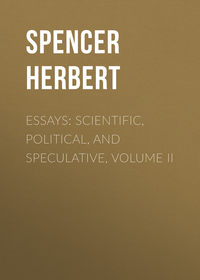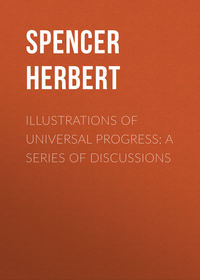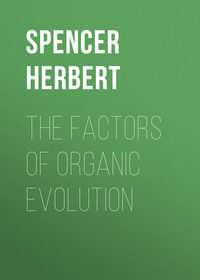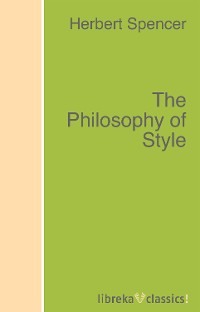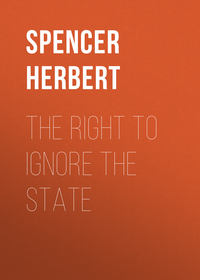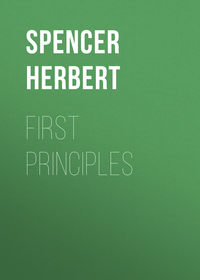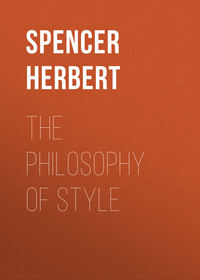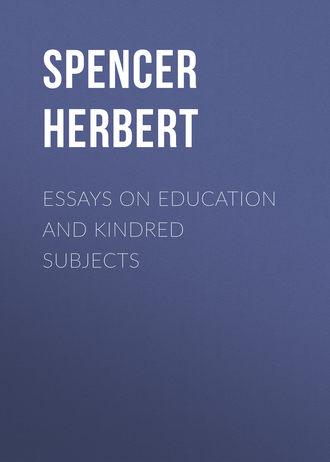 полная версия
полная версияEssays on Education and Kindred Subjects
But now mark the ramified changes which follow this change. Bronze soon replaces stone, not only in the articles it was first used for, but in many others – in arms, tools, and utensils of various kinds; and so affects the manufacture of these things. Further, it affects the processes which these utensils subserve, and the resulting products – modifies buildings, carvings, dress, personal decorations. Yet again, it sets going sundry manufactures which were before impossible, from lack of a material fit for the requisite tools. And all these changes react on the people – increase their manipulative skill, their intelligence, their comfort, – refine their habits and tastes. Thus the evolution of a homogeneous society into a heterogeneous one, is clearly consequent on the general principle, that many effects are produced by one cause.
Our limits will not allow us to follow out this process in its higher complications: else might we show how the localisation of special industries in special parts of a kingdom, as well as the minute subdivision of labour in the making of each commodity, are similarly determined. Or, turning to a somewhat different order of illustrations, we might dwell on the multitudinous changes – material, intellectual, moral – caused by printing; or the further extensive series of changes wrought by gunpowder. But leaving the intermediate phases of social development, let us take a few illustrations from its most recent and its passing phases. To trace the effects of steam-power, in its manifold applications to mining, navigation, and manufactures of all kinds, would carry us into unmanageable detail. Let us confine ourselves to the latest embodiment of steam-power – the locomotive engine.
This, as the proximate cause of our railway system, has changed the face of the country, the course of trade, and the habits of the people. Consider, first, the complicated sets of changes that precede the making of every railway – the provisional arrangements, the meetings, the registration, the trial section, the parliamentary survey, the lithographed plans, the books of reference, the local deposits and notices, the application to Parliament, the passing Standing-Orders Committee, the first, second, and third readings: each of which brief heads indicates a multiplicity of transactions, and the development of sundry occupations – as those of engineers, surveyors, lithographers, parliamentary agents, share-brokers; and the creation of sundry others – as those of traffic-takers, reference-takers. Consider, next, the yet more marked changes implied in railway construction – the cuttings, embankings, tunnellings, diversions of roads; the building of bridges, and stations; the laying down of ballast, sleepers, and rails; the making of engines, tenders, carriages, and waggons: which processes, acting upon numerous trades, increase the importation of timber, the quarrying of stone, the manufacture of iron, the mining of coal, the burning of bricks: institute a variety of special manufactures weekly advertised in the Railway Times; and, finally, open the way to sundry new occupations, as those of drivers, stokers, cleaners, plate-layers, etc., etc. And then consider the changes, more numerous and involved still, which railways in action produce on the community at large. The organisation of every business is more or less modified: ease of communication makes it better to do directly what was before done by proxy; agencies are established where previously they would not have paid; goods are obtained from remote wholesale houses instead of near retail ones; and commodities are used which distance once rendered inaccessible. Again, the rapidity and small cost of carriage tend to specialise more than ever the industries of different districts – to confine each manufacture to the parts in which, from local advantages, it can be best carried on. Further, the diminished cost of carriage, facilitating distribution, equalises prices, and also, on the average, lowers prices: thus bringing divers articles within the means of those before unable to buy them, and so increasing their comforts and improving their habits. At the same time the practice of travelling is immensely extended. Classes who never before thought of it, take annual trips to the sea; visit their distant relations; make tours; and so we are benefited in body, feelings, and intellect. Moreover, the more prompt transmission of letters and of news produces further changes – makes the pulse of the nation faster. Yet more, there arises a wide dissemination of cheap literature through railway book-stalls, and of advertisements in railway carriages: both of them aiding ulterior progress.
And all the innumerable changes here briefly indicated are consequent on the invention of the locomotive engine. The social organism has been rendered more heterogeneous in virtue of the many new occupations introduced, and the many old ones further specialised; prices in every place have been altered; each trader has, more or less, modified his way of doing business; and almost every person has been affected in his actions, thoughts, emotions.
Illustrations to the same effect might be indefinitely accumulated. That every influence brought to bear upon society works multiplied effects; and that increase of heterogeneity is due to this multiplication of effects; may be seen in the history of every trade, every custom, every belief. But it is needless to give additional evidence of this. The only further fact demanding notice, is, that we here see still more clearly than ever, the truth before pointed out, that in proportion as the area on which any force expends itself becomes heterogeneous, the results are in a yet higher degree multiplied in number and kind. While among the primitive tribes to whom it was first known, caoutchouc caused but a few changes, among ourselves the changes have been so many and varied that the history of them occupies a volume.14 Upon the small, homogeneous community inhabiting one of the Hebrides, the electric telegraph would produce, were it used, scarcely any results; but in England the results it produces are multitudinous. The comparatively simple organisation under which our ancestors lived five centuries ago, could have undergone but few modifications from an event like the recent one at Canton; but now the legislative decision respecting it sets up many hundreds of complex modifications, each of which will be the parent of numerous future ones.
Space permitting, we could willingly have pursued the argument in relation to all the subtler results of civilisation. As before, we showed that the law of Progress to which the organic and inorganic worlds conform, is also conformed to by Language, Sculpture, Music, etc.; so might we here show that the cause which we have hitherto found to determine Progress holds in these cases also. We might demonstrate in detail how, in Science, an advance of one division presently advances other divisions – how Astronomy has been immensely forwarded by discoveries in Optics, while other optical discoveries have initiated Microscopic Anatomy, and greatly aided the growth of Physiology – how Chemistry has indirectly increased our knowledge of Electricity, Magnetism, Biology, Geology – how Electricity has reacted on Chemistry and Magnetism, developed our views of Light and Heat, and disclosed sundry laws of nervous action.
In Literature the same truth might be exhibited in the manifold effects of the primitive mystery-play, not only as originating the modern drama, but as affecting through it other kinds of poetry and fiction; or in the still multiplying forms of periodical literature that have descended from the first newspaper, and which have severally acted and reacted on other forms of literature and on each other. The influence which a new school of Painting – as that of the pre-Raffaelites – exercises upon other schools; the hints which all kinds of pictorial art are deriving from Photography; the complex results of new critical doctrines, as those of Mr. Ruskin, might severally be dwelt upon as displaying the like multiplication of effects. But it would needlessly tax the reader's patience to pursue, in their many ramifications, these various changes: here become so involved and subtle as to be followed with some difficulty.
Without further evidence, we venture to think our case is made out. The imperfections of statement which brevity has necessitated, do not, we believe, militate against the propositions laid down. The qualifications here and there demanded would not, if made, affect the inferences. Though in one instance, where sufficient evidence is not attainable, we have been unable to show that the law of Progress applies; yet there is high probability that the same generalisation holds which holds throughout the rest of creation. Though, in tracing the genesis of Progress, we have frequently spoken of complex causes as if they were simple ones; it still remains true that such causes are far less complex than their results. Detailed criticisms cannot affect our main position. Endless facts go to show that every kind of progress is from the homogeneous to the heterogeneous; and that it is so because each change is followed by many changes. And it is significant that where the facts are most accessible and abundant, there are these truths most manifest.
However, to avoid committing ourselves to more than is yet proved, we must be content with saying that such are the law and the cause of all progress that is known to us. Should the Nebular Hypothesis ever be established, then it will become manifest that the Universe at large, like every organism, was once homogeneous; that as a whole, and in every detail, it has unceasingly advanced towards greater heterogeneity; and that its heterogeneity is still increasing. It will be seen that as in each event of to-day, so from the beginning, the decomposition of every expended force into several forces has been perpetually producing a higher complication; that the increase of heterogeneity so brought about is still going on, and must continue to go on; and that thus Progress is not an accident, not a thing within human control, but a beneficent necessity.
A few words must be added on the ontological bearings of our argument. Probably not a few will conclude that here is an attempted solution of the great questions with which Philosophy in all ages has perplexed itself. Let none thus deceive themselves. Only such as know not the scope and the limits of Science can fall into so grave an error. The foregoing generalisations apply, not to the genesis of things in themselves, but to their genesis as manifested to the human consciousness. After all that has been said, the ultimate mystery remains just as it was. The explanation of that which is explicable, does but bring out into greater clearness the inexplicableness of that which remains behind. However we may succeed in reducing the equation to its lowest terms, we are not thereby enabled to determine the unknown quantity: on the contrary, it only becomes more manifest that the unknown quantity can never be found.
Little as it seems to do so, fearless inquiry tends continually to give a firmer basis to all true Religion. The timid sectarian, alarmed at the progress of knowledge, obliged to abandon one by one the superstitions of his ancestors, and daily finding his cherished beliefs more and more shaken, secretly fears that all things may some day be explained; and has a corresponding dread of Science: thus evincing the profoundest of all infidelity – the fear lest the truth be bad. On the other hand, the sincere man of science, content to follow wherever the evidence leads him, becomes by each new inquiry more profoundly convinced that the Universe is an insoluble problem. Alike in the external and the internal worlds, he sees himself in the midst of perpetual changes, of which he can discover neither the beginning nor the end. If, tracing back the evolution of things, he allows himself to entertain the hypothesis that all matter once existed in a diffused form, he finds it utterly impossible to conceive how this came to be so; and equally, if he speculates on the future, he can assign no limit to the grand succession of phenomena ever unfolding themselves before him. On the other hand, if he looks inward, he perceives that both terminations of the thread of consciousness are beyond his grasp: he cannot remember when or how consciousness commenced, and he cannot examine the consciousness that at any moment exists; for only a state of consciousness that is already past can become the object of thought, and never one which is passing.
When, again, he turns from the succession of phenomena, external or internal, to their essential nature, he is equally at fault. Though he may succeed in resolving all properties of objects into manifestations of force, he is not thereby enabled to realise what force is; but finds, on the contrary, that the more he thinks about it, the more he is baffled. Similarly, though analysis of mental actions may finally bring him down to sensations as the original materials out of which all thought is woven, he is none the forwarder; for he cannot in the least comprehend sensation – cannot even conceive how sensation is possible. Inward and outward things he thus discovers to be alike inscrutable in their ultimate genesis and nature. He sees that the Materialist and Spiritualist controversy is a mere war of words; the disputants being equally absurd – each believing he understands that which it is impossible for any man to understand. In all directions his investigations eventually bring him face to face with the unknowable; and he ever more clearly perceives it to be the unknowable. He learns at once the greatness and the littleness of human intellect – its power in dealing with all that comes within the range of experience; its impotence in dealing with all that transcends experience. He feels, with a vividness which no others can, the utter incomprehensibleness of the simplest fact, considered in itself. He alone truly sees that absolute knowledge is impossible. He alone knows that under all things there lies an impenetrable mystery.
ON MANNERS AND FASHION15
Whoever has studied the physiognomy of political meetings, cannot fail to have remarked a connection between democratic opinions and peculiarities of costume. At a Chartist demonstration, a lecture on Socialism, or a soirée of the Friends of Italy, there will be seen many among the audience, and a still larger ratio among the speakers, who get themselves up in a style more or less unusual. One gentleman on the platform divides his hair down the centre, instead of on one side; another brushes it back off the forehead, in the fashion known as "bringing out the intellect;" a third has so long forsworn the scissors, that his locks sweep his shoulders. A considerable sprinkling of moustaches may be observed; here and there an imperial; and occasionally some courageous breaker of conventions exhibits a full-grown beard.16 This nonconformity in hair is countenanced by various nonconformities in dress, shown by others of the assemblage. Bare necks, shirt-collars à la Byron, waistcoats cut Quaker fashion, wonderfully shaggy great coats, numerous oddities in form and colour, destroy the monotony usual in crowds. Even those exhibiting no conspicuous peculiarity, frequently indicate by something in the pattern or make-up of their clothes, that they pay small regard to what their tailors tell them about the prevailing taste. And when the gathering breaks up, the varieties of head-gear displayed – the number of caps, and the abundance of felt hats – suffice to prove that were the world at large like-minded, the black cylinders which tyrannise over us would soon be deposed.
The foreign correspondence of our daily press shows that this relationship between political discontent and the disregard of customs exists on the Continent also. Red republicanism has always been distinguished by its hirsuteness. The authorities of Prussia, Austria, and Italy, alike recognise certain forms of hat as indicative of disaffection, and fulminate against them accordingly. In some places the wearer of a blouse runs a risk of being classed among the suspects; and in others, he who would avoid the bureau of police, must beware how he goes out in any but the ordinary colours. Thus, democracy abroad, as at home, tends towards personal singularity.
Nor is this association of characteristics peculiar to modern times, or to reformers of the State. It has always existed; and it has been manifested as much in religious agitations as in political ones. Along with dissent from the chief established opinions and arrangements, there has ever been some dissent from the customary social practices. The Puritans, disapproving of the long curls of the Cavaliers, as of their principles, cut their own hair short, and so gained the name of "Roundheads." The marked religious nonconformity of the Quakers was accompanied by an equally-marked nonconformity of manners – in attire, in speech, in salutation. The early Moravians not only believed differently, but at the same time dressed differently, and lived differently, from their fellow Christians.
That the association between political independence and independence of personal conduct, is not a phenomenon of to-day only, we may see alike in the appearance of Franklin at the French court in plain clothes, and in the white hats worn by the last generation of radicals. Originality of nature is sure to show itself in more ways than one. The mention of George Fox's suit of leather, or Pestalozzi's school name, "Harry Oddity," will at once suggest the remembrance that men who have in great things diverged from the beaten track, have frequently done so in small things likewise. Minor illustrations of this truth may be gathered in almost every circle. We believe that whoever will number up his reforming and rationalist acquaintances, will find among them more than the usual proportion of those who in dress or behaviour exhibit some degree of what the world calls eccentricity.
If it be a fact that men of revolutionary aims in politics or religion, are commonly revolutionists in custom also, it is not less a fact that those whose office it is to uphold established arrangements in State and Church, are also those who most adhere to the social forms and observances bequeathed to us by past generations. Practices elsewhere extinct still linger about the headquarters of government. The monarch still gives assent to Acts of Parliament in the old French of the Normans; and Norman French terms are still used in law. Wigs, such as those we see depicted in old portraits, may yet be found on the heads of judges and barristers. The Beefeaters at the Tower wear the costume of Henry VIIth's bodyguard. The University dress of the present year varies but little from that worn soon after the Reformation. The claret-coloured coat, knee-breeches, lace shirt frills, ruffles, white silk stockings, and buckled shoes, which once formed the usual attire of a gentleman, still survive as the court-dress. And it need scarcely be said that at levées and drawing-rooms, the ceremonies are prescribed with an exactness, and enforced with a rigour, not elsewhere to be found.
Can we consider these two series of coincidences as accidental and unmeaning? Must we not rather conclude that some necessary relationship obtains between them? Are there not such things as a constitutional conservatism, and a constitutional tendency to change? Is there not a class which clings to the old in all things; and another class so in love with progress as often to mistake novelty for improvement? Do we not find some men ready to bow to established authority of whatever kind; while others demand of every such authority its reason, and reject it if it fails to justify itself? And must not the minds thus contrasted tend to become respectively conformist and nonconformist, not only in politics and religion, but in other things? Submission, whether to a government, to the dogmas of ecclesiastics, or to that code of behaviour which society at large has set up, is essentially of the same nature; and the sentiment which induces resistance to the despotism of rulers, civil or spiritual, likewise induces resistance to the despotism of the world's opinion. Look at them fundamentally, and all enactments, alike of the legislature, the consistory, and the saloon – all regulations, formal or virtual, have a common character: they are all limitations of men's freedom. "Do this – Refrain from that," are the blank formulas into which they may all be written: and in each case the understanding is that obedience will bring approbation here and paradise hereafter; while disobedience will entail imprisonment, or sending to Coventry, or eternal torments, as the case may be. And if restraints, however named, and through whatever apparatus of means exercised, are one in their action upon men, it must happen that those who are patient under one kind of restraint, are likely to be patient under another; and conversely, that those impatient of restraint in general, will, on the average, tend to show their impatience in all directions.
That Law, Religion, and Manners are thus related – that their respective kinds of operation come under one generalisation – that they have in certain contrasted characteristics of men a common support and a common danger – will, however, be most clearly seen on discovering that they have a common origin. Little as from present appearances we should suppose it, we shall yet find that at first, the control of religion, the control of laws and the control of manners, were all one control. However incredible it may now seem, we believe it to be demonstrable that the rules of etiquette, the provisions of the statute-book, and the commands of the decalogue, have grown from the same root. If we go far enough back into the ages of primeval Fetishism, it becomes manifest that originally Deity, Chief, and Master of the ceremonies were identical. To make good these positions, and to show their bearing on what is to follow, it will be necessary here to traverse ground that is in part somewhat beaten, and at first sight irrelevant to our topic. We will pass over it as quickly as consists with the exigencies of the argument.
That the earliest social aggregations were ruled solely by the will of the strong man, few dispute. That from the strong man proceeded not only Monarchy, but the conception of a God, few admit: much as Carlyle and others have said in evidence of it. If, however, those who are unable to believe this, will lay aside the ideas of God and man in which they have been educated, and study the aboriginal ideas of them, they will at least see some probability in the hypothesis. Let them remember that before experience had yet taught men to distinguish between the possible and the impossible; and while they were ready on the slightest suggestion to ascribe unknown powers to any object and make a fetish of it; their conceptions of humanity and its capacities were necessarily vague, and without specific limits. The man who by unusual strength, or cunning, achieved something that others had failed to achieve, or something which they did not understand, was considered by them as differing from themselves; and, as we see in the belief of some Polynesians that only their chiefs have souls, or in that of the ancient Peruvians that their nobles were divine by birth, the ascribed difference was apt to be not one of degree only, but one of kind.
Let them remember next, how gross were the notions of God, or rather of gods, prevalent during the same era and afterwards – how concretely gods were conceived as men of specific aspects dressed in specific ways – how their names were literally "the strong," "the destroyer," "the powerful one," – how, according to the Scandinavian mythology, the "sacred duty of blood-revenge" was acted on by the gods themselves, – and how they were not only human in their vindictiveness, their cruelty, and their quarrels with each other, but were supposed to have amours on earth, and to consume the viands placed on their altars. Add to which, that in various mythologies, Greek, Scandinavian, and others, the oldest beings are giants; that according to a traditional genealogy the gods, demi-gods, and in some cases men, are descended from these after the human fashion; and that while in the East we hear of sons of God who saw the daughters of men that they were fair, the Teutonic myths tell of unions between the sons of men and the daughters of the gods.


